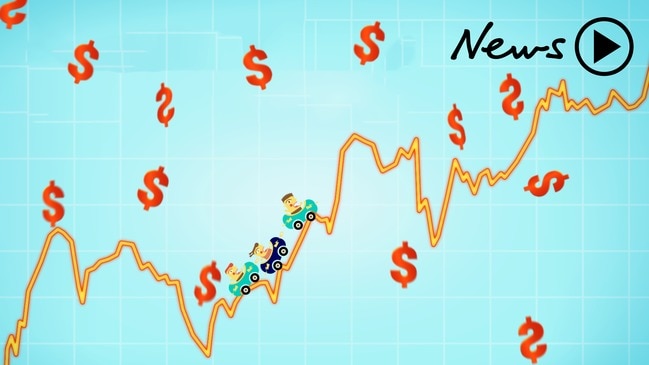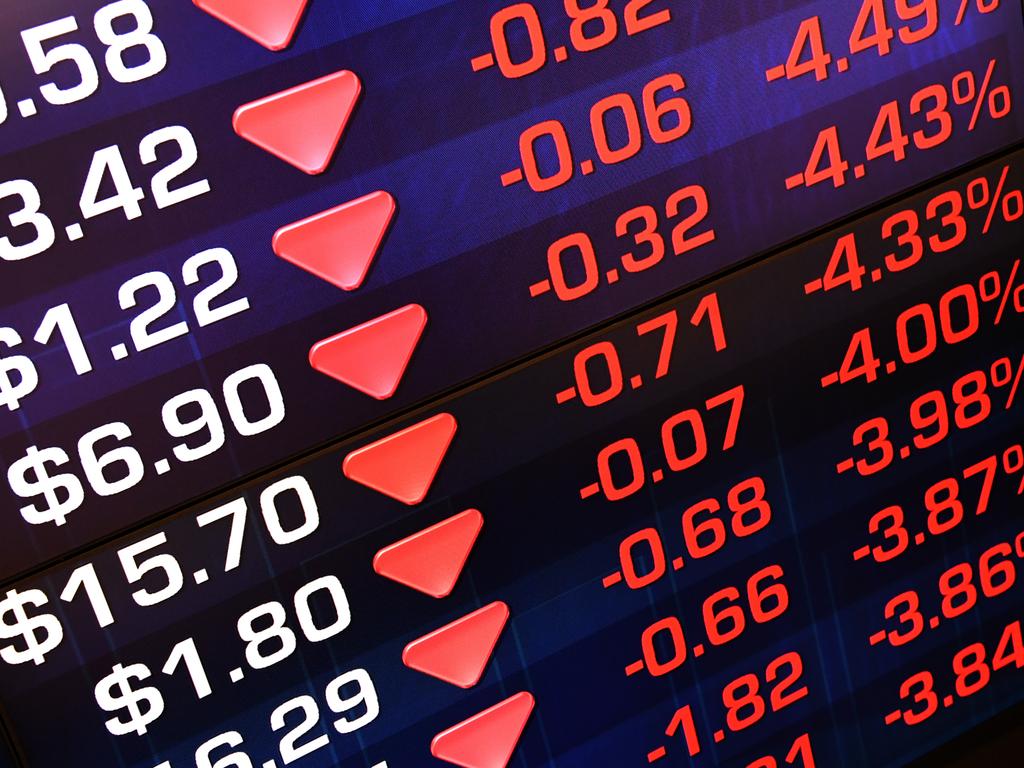Is it time to panic about the stock crash?
IF YOU think the horror stock market crash doesn’t affect you much, we have some bad news. Here’s why you should be worried.

AUSTRALIANS should be starting to get worried. Greed has turned to fear on global stock markets and that great ripping noise you hear is fortunes being shredded.
In America, stock markets fell a whopping nine per cent in just three weeks during October, before recovering slightly. Australia’s falls have been even larger, although over a longer period, as this next graph shows.

Stock markets crash all the time. And they normally bounce back. But this episode is getting to the scale where it could have an effect on the real economy. It’s time to start paying attention. Not time to panic yet — but time to be aware that some people might be starting to panic.
WHAT IS THE SHARE PRICE ANYWAY?
Excellent question. Every company has owners. Some are owned by just one person, or a group of partners. But public companies — like Myer, Woolworths, or News Corp — are owned by lots of people. The ownership is divided into thousands or even millions of shares (also sometimes known as stocks — it’s the same thing.).
People that own those shares own a piece of the company. (When the company makes profit, they send the profit to the owners. This is called a dividend, and each share you hold in a profitable public company normally entitles you to a dividend.)
MORE: Choppy Wall St pushes ASX down
MORE: ASX $50 billion wipe-out
Shares in public companies can be traded. The stock market is just like any market. Think of the ASX as Gumtree, but for pieces of ownership of massive companies. When shares change hands, the buyer and seller agree on a price, and we find out the share price. We get a new share price every time a new trade happens (which can be hundreds of times a minute). Over time that share price can go up or down.

TWO PATHWAYS TO PAIN
There are two main ways falling share prices can hurt the real economy.
One is by making people who own shares worse off (disclosure, I own some shares, including some through my super.) The recent fall in share prices made me slightly poorer. (Money I left in the bank didn’t shrink — remember to diversify, kids!)
If people get poorer, they will probably spend less, and that could flow throughout the whole economy, making life harder at cafes, shops, etc.
Now, most Australians don’t own shares outside of superannuation. The fall in shares hasn’t touched their wealth, beyond possible affecting their super that they’re not planning on touching for years anyway. Their spending is unlikely to be directly affected.
But a substantial minority of us have shares. According to a study by the ASX, 31 per cent of Aussies owned shares in 2017. That’s millions of people who watch Alan Kohler do the Finance news each night with a knot in their stomach. Are they a bit more tight-fisted if the finance news is bad? Some will be, especially if they are close to retirement.
That’s bad news for the economy, and very bad news if your job is selling expensive things to the kind of people who own lots of shares.
The second way falling share prices could hurt the real economy is by spreading anxiety about the future. In some ways, high stock prices represent confidence that companies will grow and be profitable for years to come. When stock prices fall, it means confidence is slipping.
Consumer sentiment in Australia has been pretty good recently, which has helped prevent many struggling retailers from hitting the wall. But falling share prices could smash that positive sentiment.
Falling confidence can affect anyone, even those who don’t have their money in stocks. Like home buyers. Confidence about house prices is especially vulnerable right now. In fact, everyone seems to agree they will go down for a couple of years.
Add falling stocks into the mix and you have a recipe for even more doubt and fear on house prices.

THE REAL ECONOMY
It’s important to remember that stockmarkets and the real economy are linked, they are not the same thing. A fall in stocks doesn’t always hurt the economy in which we work and play. And vice-versa. A booming economy can do nothing for stocks.
In 1987 Australia had one of the most spectacular one-day falls in stocks ever seen. The market went down 25 per cent in one day. But the economy kept chugging along.
Why are the stock market and the economy separate? Because the share price doesn’t affect the day-to-day life of most companies.
The value of the company we work for changing a few per cent is a bit like the value of the car we’re driving changing a few per cent, or the value of the house we live in changing a few per cent. It doesn’t make the motor conk out or the roof cave in. Unless we’re planning on selling that car or that house right away, it doesn’t matter much.
In a few weeks we might look back on the current dip as a blip. But pay attention. If these falls continue and extend for a few more weeks, you might start to see signs of panic creeping in.
- Jason Murphy is an economist. Follow him on Twitter @jasemurphy




